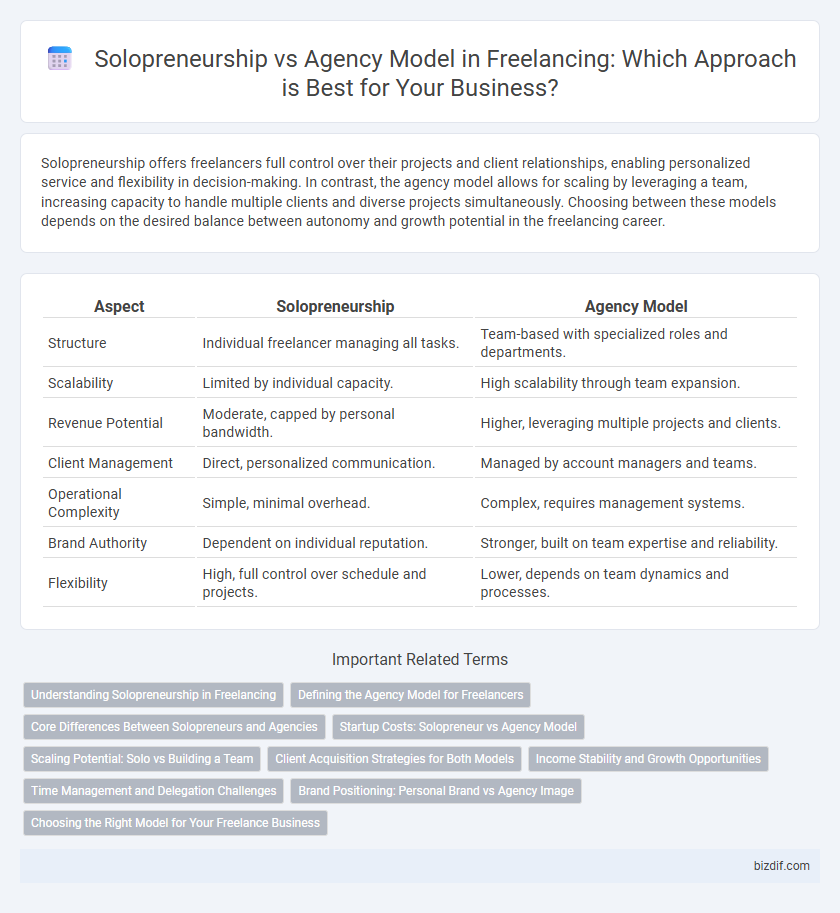Solopreneurship offers freelancers full control over their projects and client relationships, enabling personalized service and flexibility in decision-making. In contrast, the agency model allows for scaling by leveraging a team, increasing capacity to handle multiple clients and diverse projects simultaneously. Choosing between these models depends on the desired balance between autonomy and growth potential in the freelancing career.
Table of Comparison
| Aspect | Solopreneurship | Agency Model |
|---|---|---|
| Structure | Individual freelancer managing all tasks. | Team-based with specialized roles and departments. |
| Scalability | Limited by individual capacity. | High scalability through team expansion. |
| Revenue Potential | Moderate, capped by personal bandwidth. | Higher, leveraging multiple projects and clients. |
| Client Management | Direct, personalized communication. | Managed by account managers and teams. |
| Operational Complexity | Simple, minimal overhead. | Complex, requires management systems. |
| Brand Authority | Dependent on individual reputation. | Stronger, built on team expertise and reliability. |
| Flexibility | High, full control over schedule and projects. | Lower, depends on team dynamics and processes. |
Understanding Solopreneurship in Freelancing
Solopreneurship in freelancing centers on individuals managing all business aspects independently, offering personalized services and direct client communication. This model emphasizes flexibility, control over projects, and the ability to build a personal brand without the operational complexities of an agency. Freelancers who choose solopreneurship often leverage specialized skills to maintain autonomy and foster close client relationships, differentiating their offerings from larger, multi-member agencies.
Defining the Agency Model for Freelancers
The agency model for freelancers involves building a structured team where a lead freelancer manages multiple specialists to deliver comprehensive services under one brand. This model enables scalability, higher revenue potential, and delegation of tasks compared to solopreneurship, where a single individual completes all work independently. Agencies often establish standardized workflows and client management systems to ensure consistent quality and project delivery.
Core Differences Between Solopreneurs and Agencies
Solopreneurs operate independently, managing all aspects of their business, including client relations, project execution, and marketing, allowing for greater control and flexibility. Agencies, on the other hand, consist of multiple team members with specialized roles, enabling them to handle larger projects and offer a wider range of services simultaneously. These structural differences impact scalability, workload distribution, and client management approaches, defining distinctive operational models in the freelancing ecosystem.
Startup Costs: Solopreneur vs Agency Model
Solopreneurship requires minimal startup costs, often limited to a laptop, software subscriptions, and marketing expenses, making it ideal for individuals with restricted budgets. In contrast, the agency model demands significantly higher initial investments, including office space, employee salaries, specialized tools, and comprehensive branding. These financial differences impact cash flow management and scalability potential in early-stage freelancing ventures.
Scaling Potential: Solo vs Building a Team
Solopreneurs often face limitations in scaling due to time constraints and workload capacity, restricting revenue growth and project intake. Agencies, by building a team, leverage diverse skill sets and delegate tasks, enabling higher scalability and the ability to handle multiple clients simultaneously. Scaling potential is significantly enhanced in the agency model through structured processes, resource allocation, and increased operational capacity.
Client Acquisition Strategies for Both Models
Solopreneurs leverage personalized networking and niche social media platforms to attract clients, emphasizing direct relationships and tailored services. Agencies implement scalable marketing strategies including SEO, paid ads, and collaboration with industry influencers to capture larger client pools and maintain consistent lead generation. Both models benefit from strong online portfolios and client testimonials to build credibility and trust in competitive freelance markets.
Income Stability and Growth Opportunities
Solopreneurship offers direct control over income but often faces volatility due to limited client base, whereas the agency model provides diversified revenue streams by leveraging a team to handle multiple projects simultaneously. Income stability in solopreneurship can be challenging without consistent client acquisition, while agencies benefit from scalability and recurring contracts, enabling more predictable cash flow. Growth opportunities are typically higher in agency models because of increased capacity to take on larger clients and invest in marketing, talent acquisition, and service expansion.
Time Management and Delegation Challenges
Solopreneurs often face time management challenges due to handling all tasks independently, limiting their capacity to scale efficiently. In contrast, agency models leverage delegation by distributing workload among specialists, improving productivity and client service. Effective delegation remains a critical factor influencing how agencies optimize time and resources compared to the solitary workload of solopreneurs.
Brand Positioning: Personal Brand vs Agency Image
Solopreneurs leverage personal branding to establish authentic connections and build trust through individual expertise and storytelling, fostering loyalty among niche audiences. Agencies prioritize a unified brand image that conveys reliability, scalability, and diverse service offerings, appealing to clients seeking comprehensive solutions. Effective brand positioning in freelancing hinges on aligning messaging with target market expectations, where solopreneurs highlight personal identity and agencies emphasize collective strength.
Choosing the Right Model for Your Freelance Business
Choosing the right model for your freelance business depends on your goals, workload capacity, and desire for scalability. Solopreneurship offers full control, lower overhead, and a personalized client experience, ideal for freelancers seeking autonomy and flexibility. The agency model enables growth through team collaboration, increased project volume, and diversified service offerings, suitable for those aiming to expand their business and revenue streams.
Solopreneurship vs Agency Model Infographic

 bizdif.com
bizdif.com